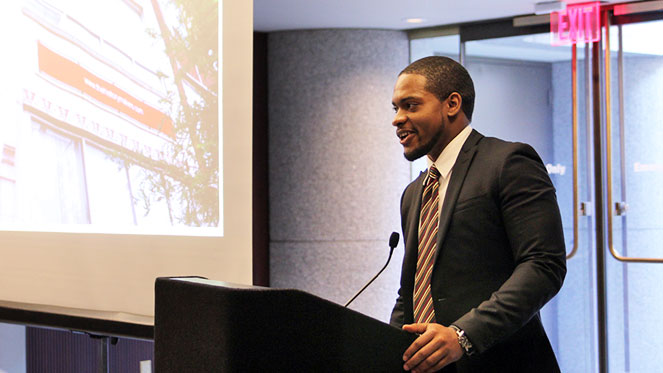
Behind the Scenes at The HistoryMakers
The HistoryMakers is the largest African-American oral video archive in the world. Thanks to a longtime partnership with Carnegie Mellon University, the online database is searchable and available for students and scholars at subscribing institutions including CMU, Harvard, Yale and Princeton, among many others.
But that’s not where the CMU connection ends — Dietrich College of Humanities and Social Sciences alumnus Dionti Davis has been working for the project since he graduated in 2014. Davis, who majored in history, is currently the special assistant to the executive director for the Chicago-based non-profit. He recently talked to Dietrich College News about his work.
Were you familiar with CMU’s work with The HistoryMakers before you started working with the nonprofit?
I had no idea! It was a funny coincidence for me when I heard that CMU had worked so closely with The HistoryMakers, but I had never heard about it.
What is a typical day like for you at The HistoryMakers?
The HistoryMakers is a small non-profit, so for me, a typical day can span several different areas. I can be found drafting or editing a grant proposal; coordinating logistics for a fundraising event; traveling to a school to make a presentation; producing our annual PBS-TV program; writing or editing biographical information; interacting directly with some of the amazing men and women that we have interviewed; or simply taking care of the constant scheduling and administrative tasks that build up. As the special assistant to the executive director, I also get the opportunity to peek behind the veil and see some of the lesser-known parts of running a non-profit.
Why do you see this work as important, particularly in view of what’s happening in America today?
I think that right now, the country lacks a sense of mutual understanding between people of different racial and ethnic backgrounds. Too often, people are simply categorized as the “other,” making it much easier to write off their issues as unimportant or irrelevant to our own lives. I think that work like The HistoryMakers allows people to connect and empathize across the social divisions we place on ourselves, by letting them not only hear, but also see, the emotions and expressions of each interviewee. The stories presented in The HistoryMakers collection are so much more powerful than simply reading a book, because they are brought to life for the student, researcher or casual observer. I think, also, that exposing college students and younger generations to the content can help them to relate and bridge the generational gap that I see in today’s movements for civil and human rights.
I think it’s also important to mention that a project like The HistoryMakers is especially important at a university like CMU, where the population of African-Americans is so small. Being able to find stories of HistoryMakers who have similar experiences, backgrounds and interests — whether at CMU or at comparable universities — can be a source of strength for students to stay focused and persevere. I know that personally, I would never have made it through CMU without support and advice from mentors like Joe Trotter and Edda Fields-Black. That support system, and the example of a pathway already travelled, is essential to ensuring that African Americans and students from other minority groups have the same opportunities to succeed. At The HistoryMakers, we believe that the connections students draw to our stories can start to lay that foundation.
What led you to CMU and a degree in history?
In high school I loved history and biology, and was initially attracted to CMU by the Biomedical Engineering & Materials Science double major. That is actually the program that I applied for and was accepted into. However, the history courses I took fascinated me in a way that my engineering and science classes didn’t, so I eventually switched over to the history department. I was much more comfortable in history and found myself connecting much more deeply with my coursework, so I think I made the right decision.
Were there any professors who you stay in contact with or were mentors during your time at CMU?
Yes, I have kept in touch with two primarily - Professor Trotter and Professor Fields-Black. The HistoryMakers worked directly with Professor Trotter to set up our announcement at this year’s CAUSE reception, and he was actually instrumental in helping to facilitate an opportunity for me to work at the Senator John Heinz History Center as a project intern for the award-winning From Slavery To Freedom exhibit. Professor Fields-Black was my closest mentor while at CMU, as a student and as a researcher. I worked with her husband Samuel Black, the curator of African American Collections at the Heinz Center, during my internship; and also worked with her closely as a research assistant, documenting runaway slave advertisements from the antebellum southeast.
What do you miss the most about CMU?
I miss the intellectual environment at CMU. The campus is truly filled with people who are genuinely inquisitive and passionate about their chosen subjects, but whose interests are very much interdisciplinary in nature. No matter who you meet or talk to as you walk around, you can see that while they may specialize in one field, they have deep interests in another. That kind of intellectual diversity and cross-pollination of ideas is important, I think, and helps everyone expand their own thinking and mindset.
Related Article
_____
By Shilo Rea
Dionti Davis speaks at the Fall 2016 CAUSE reception on CMU’s campus.